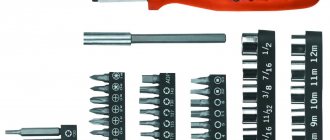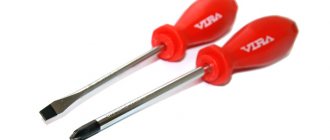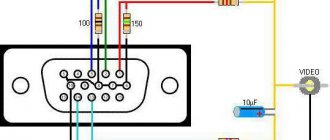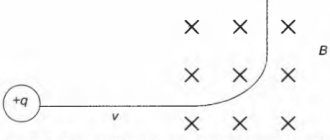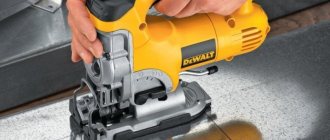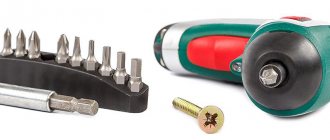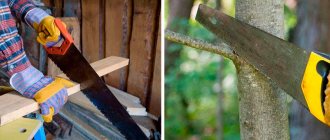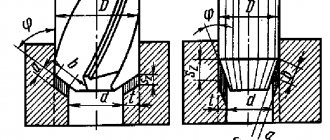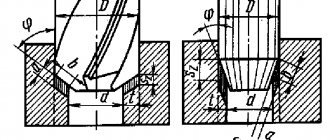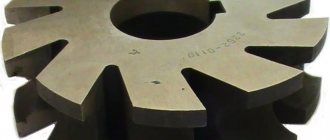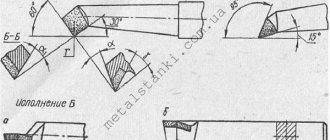A screwdriver is an indispensable tool for every self-respecting owner. It is found in almost every home, and you don’t have to be a specialist or master to be able to use it. People began to widely use this tool back in the 18th century, and since then the screwdriver has undergone significant evolutionary changes. In addition to the fact that new types of slots have appeared, changes have also affected the handles, which are able to reach the target even in hard-to-reach places.
Design features
Flat and shaped screwdrivers have one thing in common - the design of the tool. It consists of a round metal rod with a tip and a handle.
Kernel
Indicator screwdriver - how to use it correctly
The steel axis is the part that transmits the force of the hand from the handle to the tip of the screwdriver. The material for this is especially strong steel. Products differ in the length and thickness of the rods, the cross-section of which can be round or multifaceted.
Important! The rod can have different lengths, diameters and cross-sectional shapes. Standard length is 100-200 mm. The shaft is usually coated with nickel or chrome to protect against corrosion. The rods are also made of stainless steel.
Lever
This part is mainly made of plastic. The quality of the material affects the durability of the handle. Modern handles of high-quality products have non-slip rubberized inserts, a finger rest, and a large area for hand grip and palm rest.
Also at the bottom of the handle a transverse through hole is made to enhance torque. A rod is inserted through it to obtain additional force.
Professional OS on the handles have gel inserts that fit tightly to the palm, which ensures maximum transfer of force to the sting.
Sting
The effectiveness of the sting largely depends on the quality and strength of the tip material. Tips made from C-2 tool steel are considered high-quality and reliable tips. Particularly durable tips are made from molybdenum-vanadium alloy.
Flat head screwdriver
What are the differences between a Phillips and a flathead screwdriver?
A Phillips screwdriver is the most popular tool for repairs.
Range and features of use:
- They vary in tip diameter.
- Suitable for most types of screws, screws and self-tapping screws.
- To facilitate operation, the tip of the tool is supplemented with a magnet.
One of the most popular models.
Next, the specifics and features of using a flat or slotted screwdriver are discussed. The blade of a flat-head screwdriver is made of a narrow plate.
Previously, the majority of fasteners were made with a straight tip line. In this case, it is necessary to select a tip of the required length.
Today, such fasteners are used less frequently, and their installation is carried out only with the flat end of a screwdriver. Cross versions of the tool make it possible to install and detach shaped fasteners.
Magnetic models have a stronger tip
The tip of this screwdriver has a large number of projections, which allows for a tight grip on the parts being unscrewed. Cross models allow you to work with household items, wood and metal. Flathead screwdrivers are more used for fastening door handles, sockets and other small elements.
Features of using a flat-tip screwdriver:
- Suitable for screwing in and out screws.
- Used less frequently than the cross "colleague".
- The length of the tip is measured in millimeters.
Note! Screwdrivers also differ in the shape of the tip that is selected. It all depends on the purpose of use. In addition, the sizes of flathead and Phillips screwdrivers differ. The parameter is selected depending on the diameter of the screw.
You may be interested in Transformer for welding
Markings and dimensions of a slotted screwdriver
Pulse soldering iron gun
Branded products have markings placed on the longitudinal surface or on the end of the handle. It meets the requirements of the international classification of hand tools. If you need a tool for household needs: unscrew and tighten screws, then you need to understand what the marking of the tool means: SL , PH , PZ :
- SL – regular flat spline;
- PH – Phillips screwdriver;
- PZ – the same with the presence of thin ray lines.
The marking can be in the form of a circle, inside which the pepper section of the tip is depicted. So, for example, flat screwdrivers are indicated by a stripe, Phillips screwdrivers - by a cross in a circle. All indicator instruments have a flat tip. Accordingly, shaped screwdrivers in the marking are displayed by the type of tip profile.
Hardware with various slot shapes
Around the circle, the manufacturer indicates the dimensions of the slot and the length of the rod. Marking with a circle with a stripe inside it. The dimensions of a slotted screwdriver are marked on the rim: 1.2 x 6.5 x 125 mm means that this is a flat screwdriver, designed to work with screws whose slots have dimensions of 1.2 x 6.5 mm, the length of the rod is 125 mm.
A marking with a cross containing the inscription PH 1 x 80 mm means a Phillips screwdriver of the following dimensions: 1 – fastener head diameter number, shaft length – 80 mm.
Cross School
Parameters of Phillips screwdrivers
Many craftsmen use automatic devices in their households. But this is just a technological trend of the times that will not replace the use of a conventional screwdriver, which requires mechanical action and some physical effort.
Without the help of tools, the screws cannot be tightened with sufficient force.
The popularity of Phillips screwdrivers is explained by their wide range of applications. They have a specialized designation in the form of a cross and the letters RN. They are considered indicators of the size of the tool. The minimum one is marked “000”. This means that with such a screwdriver you can screw fasteners up to 1.5 mm.
Approximate markings and their meanings:
- 00 - 1.5-1.9 mm;
- 0 - 2 mm;
- 1 - 2.1-3 mm;
- 2 - 3.1-5 mm;
- 3 - 5.1-7 mm;
- 4 - more than 7.1 mm.
developed the PZ slot.
The marking indicates not only the size of the tip, but also the thickness of the rod.
The length of the handle should be selected depending on the space in which the work will take place. So, if installation takes place in a narrow room, it is recommended to choose a model with a short handle. If it is difficult to get to the fastening point, you should choose a tool with a rod length of 300 mm.
The value of RN stands for the name. It happens that instruments are marked PZ, which stands for “Pozydrive”.
invented the PH slot
The tool with the latest marking has an additional beam that provides a stronger hold when fastening. It allows you to fasten cabinet furniture, drywall and aluminum profiles during assembly.
When choosing, consider the rod strength. By standards, it has an indicator of 47-52 units. If the number is less, the tip will bend, and if it is more, it will break.
For your information! Most often, the strength indicator is denoted by the letters Cr-V.
Types of screwdrivers
Electrician's kit - what tools are included?
What types of screwdrivers there are can be represented by a fairly large list. You should consider popular and highly specialized types of screwdrivers.
Dielectric
To work with electrical equipment, use a dielectric screwdriver. It does not allow current up to 1000 V to pass through it. The entire instrument is covered with special plastic up to the tip. Electricians use such OSHs to work in electrical cabinets and switchboards.
Tool with dielectric coating
Reversible
The sonic screwdriver is equipped with ratcheting mechanisms. When the tip rotates, the ratchet makes a ratcheting sound. The tool can only rotate in one direction. To turn on the reverse mode, move the lever. Thanks to this device, the master tightens or unscrews the screw without removing the tip from the fastener slots. Reversible tools are otherwise called minus screwdrivers.
Reversible screwdriver
Hexagon
Hexagon-shaped screwdriver slots allow you to apply maximum force to the tool without fear of cutting off the edges of the tip or slots. Fasteners are used in places where the requirements for the strength of the connection of parts are especially high.
Star-shaped
Star-shaped splines are especially popular in the countries of the American continent. In European products for various purposes, star screws are quite common in electronic devices. Their use is subject to the same requirements as for hexagonal tips.
Square
A square-shaped slot is not found in everyday life. Hardware with square openings in the heads is used for mounting parts of special equipment, including in the defense industry.
U-shaped OS
Tools with double tips are called spanners. They are used in elevator facilities. The complex configuration of the tips is aimed at preventing incidents of vandalism in elevator cabins.
Fork
Similar to U-shaped screwdrivers, except that instead of two blades, they have a triple tip. This is a purely professional tool. Screws with such slots are not found in everyday life.
Triangular
Triangular screwdrivers are professional tools. Triangle screwdrivers are compatible with slotted screws that have a similar configuration. Triangular screwdrivers are used for opening and installing panels where access to cabinets and panels with electrical or other equipment is limited.
For One-way slot
The name One-way translated from English means “one way path”. Unscrewing hardware with such a head is only possible with a special tool. Any use of other types of tips results in cutting off the splines. The fastener resists unauthorized entry into various devices.
Bristol
The shape of the spline resembles a six-pointed gear. You can unscrew such hardware only with a Bristol tip. Otherwise, the slot is destroyed and the screw has to be drilled out. Hardware can be found in radio electronics service centers. They are used to protect against vandal penetration into devices.
For Torg-Set slot
The tip is made for a slot in the form of a cross with an offset center. Hardware with such splines is practically not found in Russia.
For muna Torx slot
Screwdrivers for this type of slot have a tip in the form of a six-pointed star. They are necessary in workshops where mobile phones and various gadgets are repaired.
For star spline
The star tip is designed for screws with six-pointed star slots. The stars have sharper peaks. The scope of application is the same as that of the previous type of tool.
It is important to distinguish between the last two types, because using PZ for screws with PH slots can damage the self-tapping screw. As a result, the fasteners will have to be drilled out, and the screwdriver itself will fail.
Splines and tips
Note! If you have to deal with soured hardware, use an impact screwdriver. It is equipped with a thick metal cap at the end of the handle that can withstand hammer blows. When struck, the tip of the tool rotates with powerful force.
Types of handles
Screwdriver handles have also undergone considerable changes during the evolution of household and professional tools. They have become more comfortable, more powerful and stronger. And some have added complex elements with rotational mechanisms. In addition to the traditional types, there are also the following:
- Handle with heel. This type of screwdriver is characterized by the fact that the rod is located along the entire length of the tool and comes out from the reverse side. The concept of "heel" arose because the area that protrudes from the other side forms a thick projection that can be hit with a hammer. Used in dirty and rusty places where a screwdriver can be used as a chisel.
- Handle with ratchet. It works as an intermittent movement in one direction with a conversion of reciprocating rotational movement and a switch that allows you to change the direction of movement. Typically, such screwdrivers are produced with a set of various attachments, allowing the tool to be used on almost all types of fasteners.
- Swivel or T-shaped. Such a screwdriver is made in the shape of the letter T or with a hole in the upper part of the handle for additional leverage, which allows such a tool to tighten fasteners as tightly as possible.
Depending on the type of work, the inaccessibility of the fastening element, as well as the type of fastener itself, different types of attachments and sizes of screwdriver rods are used. From the miniature length of the rod, measured in millimeters, to the longest, several tens of centimeters. From a regular flat attachment to a hex ratchet. There is also a screwdriver with a flexible shaft for getting into hard-to-reach places.
How to choose a screwdriver
In order for the tool to serve for a long time and be comfortable to use, it is important to make the right choice of product. You need to understand what the OS will be used for.
Disassembling or installing parts of small devices will require the use of precision screwdrivers. They are used to disassemble or assemble watches, mobile phones, and the like.
For quick installation or disassembly of facing materials, furniture and other things, it is better to use an OS with a ratchet mechanism. A ratchet is a mechanism that allows the tool tip to rotate in only one direction. Such devices are equipped with a reversing device that changes the working stroke of the screwdriver clockwise and vice versa.
Products with a set of removable tips allow you to save on the purchase of tools with different tips. Stings can be purchased as needed. All handles and removable rod ends are compatible, regardless of their manufacturer. The set with interchangeable tips, shown in the bottom photo, allows you to quickly replace the tip with another tip.
Set of removable tips
Additional Information. When choosing a screwdriver, you need to pay attention to the quality of the plastic and the ergonomics of the handle. The quality of the metal from which the tip is made matters. The best material for this is chrome vanadium steel.
Operation of screwdrivers
To operate the OS correctly, you must adhere to several rules:
- In the marking of products, according to GOST, the type of slot is encrypted (see the chapter “Marking” above). The screwdriver must be used in full accordance with the type and size of the slot;
- It is better to store the tool in a suspended state. In this case, the tips will be protected from accidental damage;
- Clean instruments are stored in dry indoor conditions that do not provoke metal corrosion.
Self-production
You can make a screwdriver from any metal rod or nail. The rod is ground on a grinding machine on one side. Usually they make a tool with a tip for a straight slot.
Home craftsmen grind a head with an opening for replacement bits. It is welded to the end of the rod. The end of the rod on the other side is bent with a hook. You can use an old key for the blank. This is convenient because the tool can be carried on a key ring.
For a homemade cross OSH you will need a milling machine and a sharpener. The tip of the rod is milled, achieving a cruciform cross-section of the rod. Then the finished tip is ground into a cone shape.
An L-shaped fold is placed between the cut halves of a round block. Then both pieces are tightened with clamps. In another case, the bent end of the rod is placed in a mold and filled with epoxy resin. The handle is then ground down for comfortable hand grip.
The correct selection of slotted screwdrivers facilitates quick and efficient repair and installation of various devices and instruments with threaded connections. You can easily purchase suitable hand tools in the retail chain.
